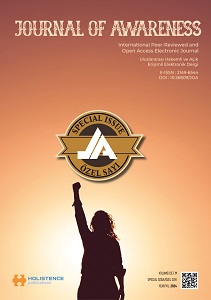Cyber bullying and victims among adolescents depending on perceived parental attitudes
Cyber bullying and victims among adolescents depending on perceived parental attitudes
Author(s): Hilal KarayazıSubject(s): Sociology, Studies in violence and power, Family and social welfare, ICT Information and Communications Technologies
Published by: Rating Academy
Keywords: Cyber Bullying; Cyber Victimization; Parental Attitude; Cyber Violence;
Summary/Abstract: Being a cyberbully and being a cyber victim is a common problem that negatively affects the lives and psychological well-being of children and young people. This situation arises with the increase in internet usage. Being a cyber bully and being a cyber victim negatively affects the psychosocial development of children and adolescents. Family environment, parental behavioral attitudes and various factors play an important role in adolescents’ involvement in cyber aggression and cyber victimization. Aim: This study aimed to examine the relationships between perceived parental attitudes (democratic, authoritarian, protective and permissive) and cyber bullying (cyber aggression-victimization) in adolescents. These relationships were investigated by taking into account demographic variables such as gender, age, grade level, and own internet usage time. Materials and Methods: The sample of the research consists of 125 high school students between the ages of 14- 18 studying at a private high school in Istanbul. Data were collected from students in the classroom using the survey method. As a data collection tool in the research; Personal Information Form, Parental Attitudes Scale and Cyberbullying Scale were used. IBM SPSS Statistic Base 25.0 was used to analyze the data collected in the study. The following analyses, respectively; descriptive, reliability, normality and Pearson Correlation were performed. Conclusion: According to the findings of the research, it was determined that there was a positive and moderate relationship between the characteristics of parents having a permissive attitude (r: 0.365 p: 0.000) and having an authoritarian attitude and the students’ exposure to cyber bullying (r: 0.334 p: 0.000). However, it was determined that there was a negative and moderate relationship (r: -0.552 p: 0.000) between parents’ democratic attitudes and students’ exposure to cyberbullying. Results: According to the results of the research, students’ exposure to cyberbullying behavior will increase when they are faced with authoritarian and permissive parental attitudes, and the exposure to cyberbullying behavior will decrease in children of parents whose internet usage time is controlled and who have democratic attitudes.
Journal: Journal of Awareness (JoA)
- Issue Year: 9/2024
- Issue No: Sp. Iss.
- Page Range: 67-77
- Page Count: 11
- Language: English

